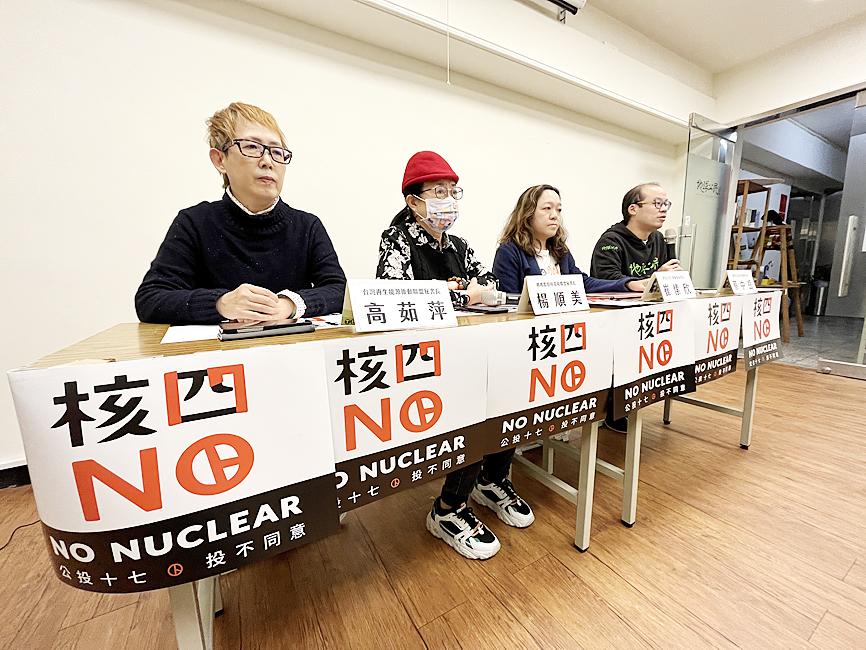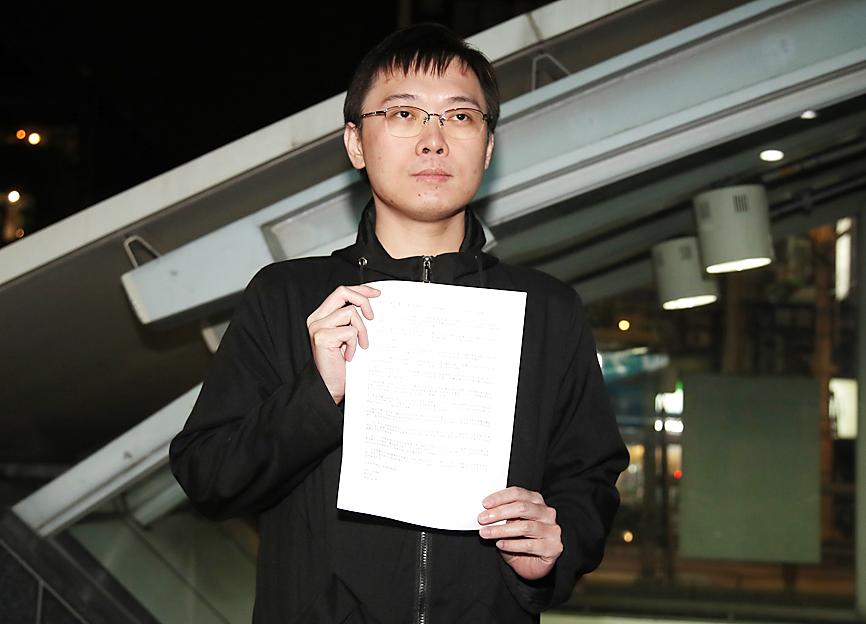A majority of voters yesterday rejected a proposal to restart construction on the mothballed Fourth Nuclear Power Plant in New Taipei City’s Gongliao District (貢寮), with 4,262,451 votes against and 3,804,755 in favor.
Initiated by nuclear power advocate Huang Shih-hsiu (黃士修), the referendum asked voters: “Do you agree that the Fourth Nuclear Power Plant should be activated for commercial operations?”
The plant was most recently mothballed in 2015 when Ma Ying-jeou (馬英九) of the Chinese Nationalist Party (KMT) was president, one year after former Democratic Progressive Party (DPP) chairman Lin I-hsiung (林義雄) staged a hunger strike against the plant’s construction.

Photo: CNA
The referendum has garnered the most “no” votes among the four referendums held yesterday, Citizen of the Earth, Taiwan deputy executive director Tsai Chung-yueh (蔡中岳) told a news conference in Taipei yesterday.
The result showed that voters are concerned about the plant’s location in an earthquake-prone area and nuclear waste disposal, he said.
While another referendum in 2018 indicated mayority support for nuclear power, yesterday’s vote showed that Taiwan would continue its efforts to become “a nuclear-free homeland,” Tsai said, thanking voters for lending support for energy transition.

Photo: CNA
“Finally, the Fourth Nuclear Power Plant [is] history,” Green Citizens’ Action Alliance secretary-general Tsuei Su-hsin (崔愫欣) said.
The plan to construct the plant goes back to the 1980s, when the nation was under martial law, she said, adding that the plant has been a symbol in the nation’s political struggles.
The government should start making plans to demolish the unfinished plant, and review its effect on the nation’s budget and how to use the site, Tsuei said.
Huang wrote on Facebook that he regretted that the referendum had failed.
The government would never tackle the nuclear waste issue, and burned fuel rods would probably be permanently stored in New Taipei City, Huang said, referring to storage sites at two other plants in Shihmen (石門) and Wanli (萬里) districts.
Without the Fourth Nuclear Power Plant, the government would burn more coal, leading to more air pollution in central and southern Taiwan, as well as more deaths, Huang added.
The nation’s transition to renewable energy sources is behind schedule, and Taiwan might face serious electricity shortages, he said.
The ruling and opposition parties should jointly consider extending the licenses of Wanli’s Guosheng Nuclear Power Plant and Pingtung County’s Ma-anshan Nuclear Power Plant, he said.
Alternatively, Taiwan could follow the global trend and treat nuclear power as “green” energy, Huang said, suggesting the construction of a small modular reactor at the site of the Fourth Nuclear Power Plant.
The Atomic Energy Council in 2017 approved Taiwan Power Co’s (Taipower) plan to decommission Shihmen’s Jinshan Nuclear Power Plant within 25 years.
Decommissioning of four units at the Guosheng and Ma-anshan plants would begin before 2025, the council said.
Another referendum in 2018 prompted the government to nullify Article 95-1 of the Electricity Act (電業法), which stipulated that all nuclear power plants should go offline by 2025.
However, the government has not made any attempts to change the timetable for the decommissioning of nuclear reactors since the 2018 vote.
Last year, about 12.7 percent of the nation’s electricity was generated by nuclear plants, 40.8 percent by gas-fired units, 36.4 percent by coal-fired units, 5.8 percent by renewable sources and the rest by mixed sources, data on Taipower’s Web site shows.

Taiwan has received more than US$70 million in royalties as of the end of last year from developing the F-16V jet as countries worldwide purchase or upgrade to this popular model, government and military officials said on Saturday. Taiwan funded the development of the F-16V jet and ended up the sole investor as other countries withdrew from the program. Now the F-16V is increasingly popular and countries must pay Taiwan a percentage in royalties when they purchase new F-16V aircraft or upgrade older F-16 models. The next five years are expected to be the peak for these royalties, with Taiwan potentially earning

STAY IN YOUR LANE: As the US and Israel attack Iran, the ministry has warned China not to overstep by including Taiwanese citizens in its evacuation orders The Ministry of Foreign Affairs (MOFA) yesterday rebuked a statement by China’s embassy in Israel that it would evacuate Taiwanese holders of Chinese travel documents from Israel amid the latter’s escalating conflict with Iran. Tensions have risen across the Middle East in the wake of US and Israeli airstrikes on Iran beginning Saturday. China subsequently issued an evacuation notice for its citizens. In a news release, the Chinese embassy in Israel said holders of “Taiwan compatriot permits (台胞證)” issued to Taiwanese nationals by Chinese authorities for travel to China — could register for evacuation to Egypt. In Taipei, the ministry yesterday said Taiwan

‘LIKE-MINDED PARTNER’: Tako van Popta said it would be inappropriate to delay signing the deal with Taiwan because of China, adding he would promote the issue Canadian senators have stressed Taiwan’s importance for international trade and expressed enthusiasm for ensuring the Taiwan-Canada trade cooperation framework agreement is implemented this year. Representative to Canada Harry Tseng (曾厚仁) in an interview with the Central News Agency (CNA) said he was increasingly uneasy about Ottawa’s delays in signing the agreement, especially as Ottawa has warmed toward Beijing. There are “no negotiations left. Not only [is it] initialed, we have three versions of the text ready: English, French and Mandarin,” Tseng said. “That tells you how close we are to the final signature.” Tseng said that he hoped Canadian Prime Minister Mark Carney

POSITIVE DEVELOPMENT: Japan and the US are expected to hold in-depth discussions on Taiwan-related issues during the meeting next month, Japanese sources said The holding of a Japan-US leaders’ meeting ahead of US President Donald Trump’s visit to China is positive news for Taiwan, former Japan-Taiwan Exchange Association representative Hiroyasu Izumi said yesterday. After the Liberal Democratic Party’s landslide victory in Japan’s House of Representatives election, Japanese Prime Minister Sanae Takaichi is scheduled to visit the US next month, where she is to meet with Trump ahead of the US president’s planned visit to China from March 31 to April 2 for a meeting with Chinese President Xi Jinping (習近平). Japan and the US are expected to hold in-depth discussions on Taiwan-related issues during the